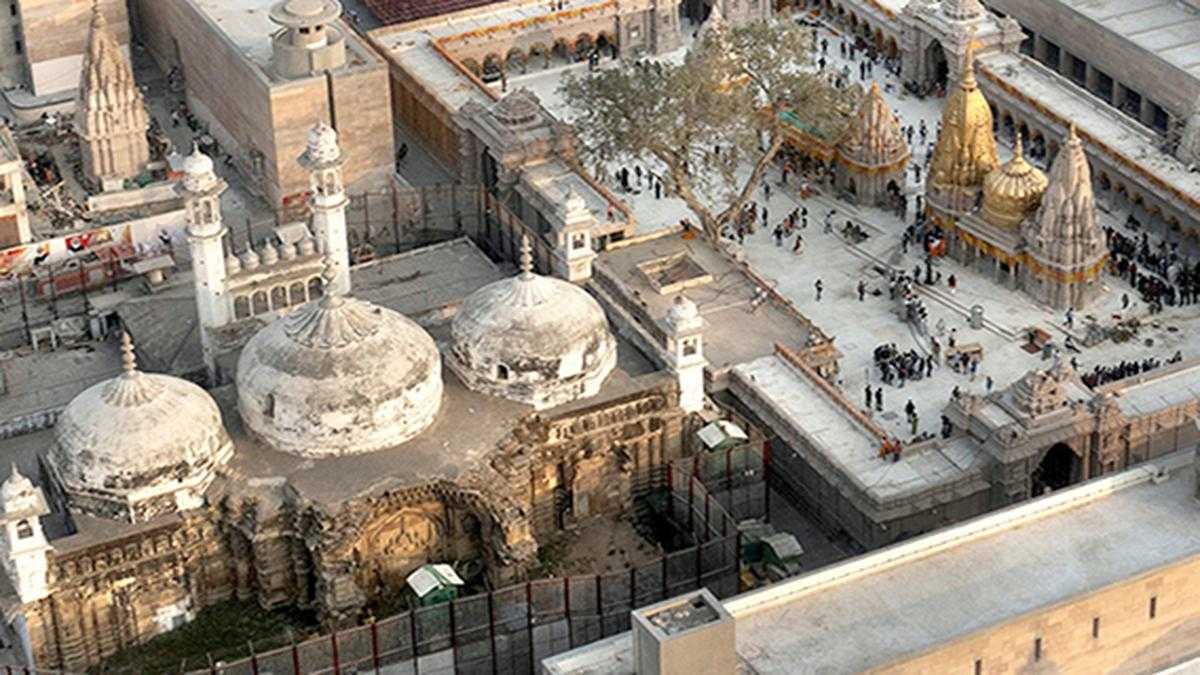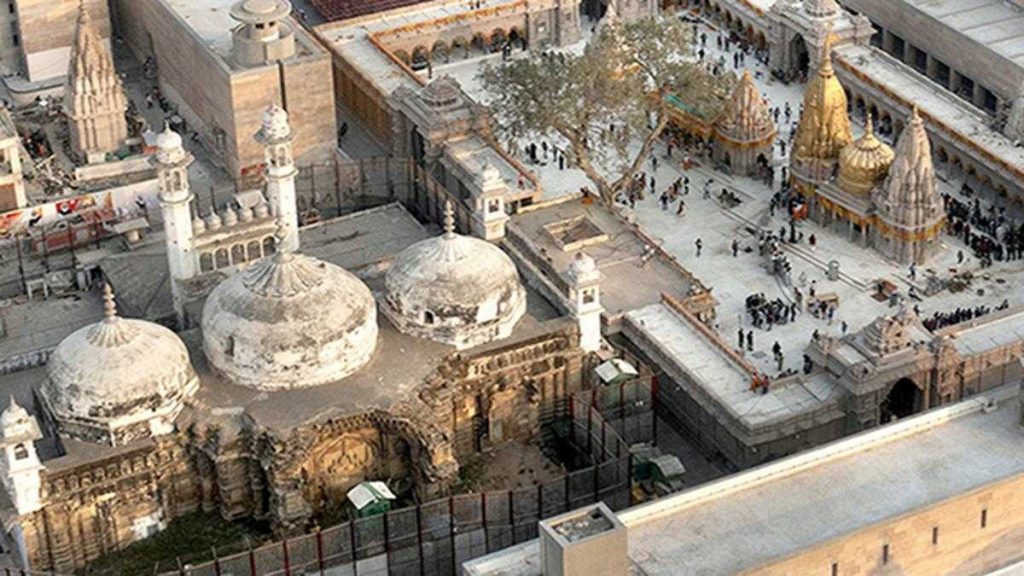
Supreme Court sanctions survey of 400 yr old Mosque to find a Hindu Temple underneath
By Staff Writer
A three-judge bench of the Supreme Court of India, on Friday (4), upheld an Allahabad high court order allowing the Archaeological Survey of India (ASI) to conduct an investigation of the Gyanvapi mosque in Varanasi, which had been permitted by the local district court. The bench, including Chief Justice D.Y. Chandrachud (CJI), Justices J.B. Pardiwala, and Manoj Misra, ruled that the ASI shall continue surveying the controversial religious complex, but that it should be conducted through “non-invasive” processes, without damaging the structure.

The Mosque masjid committee had planned to boycott the ASI’s survey, but has decided to cooperate with the ASI in light of the court’s ruling. This order of the district judge has been occasioned by an application filed by four Hindu women worshippers seeking year-round access to worship inside Mosque premises.
India’s Places of Worship (Special Provisions) Act (PWA) of 1991, prevents the conversion of the religious character of a place of worship from how it existed on August 15, 1947.
The Mosque
The Gyanvapi Mosque (Masjid), is located in Varanasi, Uttar Pradesh, near Kashi Vishwanath Temple and holds significant historical and religious importance. It is an active place of worship for Muslims and attracts worshippers from all over the world.
It is believed that the mosque was constructed by Mughal Emperor Aurangzeb in 1664 CE after demolishing a Hindu temple dedicated to Lord Shiva. It is claimed that the temple was known as the original Kashi Vishwanath Temple and was considered one of the holiest sites for Hindus.
On an earlier occasion the district court ordered sealing of a portion of the mosque, in which Hindu women claimed Shiva Linga was found there. Denying this claim, the Indian American Muslim Council (IAMC) stated this order “puts spotlight on the rot that infests the Indian judiciary, which is actively facilitating the Hindu rightwing’s project of converting India into a Hindu Rashtra.”
Arguments
As reported by LiveLaw, on behalf of the Masjid Committee, the petitioners, Advocate Huzefa Ahmadi Ahmadi argued in Court that the very process of the survey is barred by the PWA.
“By ordering the survey, and by going back in the history as to what happened 500 years ago, are you not violating the Places of Worship Act?” Ahmadi asked. He said the survey “totally impinges upon fraternity, secularism, and statements of objects of the Places of Worship Act”.
CJI stated what is impugned is an interlocutory order appointing commissioner and that maintainability and objections to commission evidence remain open for further consideration in the final hearing later.
Ahmadi asked, “if tomorrow someone files a frivolous suit and on the first date ask for a survey as to whether there is something underneath, will your lordships ask the Archeological Survey to have a survey as a matter of course?“
CJI replied, “Mr. Ahmadi, what is frivolous to you is faith on the other side. How can we comment?” and avoided answering the question.
It is reported that the Solicitor General of India Tushar Mehta undertook that no excavation will be carried out at the Mosque.
“The process is such that you are reopening the wounds of the past. When you start a survey, you are unravelling the wounds of the past. And it is the very same thing the Places of Worship seeks to prohibit”, Ahmadi urged.
Arguing on behalf of Hindu worshipers, the plaintiffs, counsel Madhavi Divan rationalized the ASI survey taking place, as it “is a process of taking expert evidence which will be beneficial to all parties”. Reportedly, it has been argued that the plaintiffs sought for “reliefs to worship the visible and invisible deities in the structure” as “certain signs and symbols have clearly been seen there. It’s logical to reach the conclusion via scientific study”.
The PWA does not bar the determination of a religious character of a place as it stood before the cut-off date of August 15, 1947, she has argued.
“There will be applications and applications in future, saying some discovery was made here, allow pooja there. All this while it remains a mosque property. Piece by Piece, we will be edged out of the property”, Ahmadi expressed his concerns.
Ayodhya Mosque case
Indian judiciary conniving with Hindutva extremism and condoning violence against Muslims is not unprecedented.
In a shameful legal travesty, in September 2020, a Special Court at Lucknow acquitted all 32 persons accused of criminal conspiracy behind the demolition of the Babri Masjid mosque on December 6, 1992, including former top leaders of the ruling Hindu supremacist Bharatiya Janata Party (BJP). The Babri Masjid was a 475-year-old mosque situated in Ayodhya, Uttar Pradesh.
The court ruled that the demolition was not the outcome of a “preplanned conspiracy,” despite enough evidence, including hundreds of videos and witnesses, showing that Hindu supremacists mobilized and incited Hindu fanatics to demolish the mosque, with axes, crowbars, ropes and other instruments. The razing of Babri Masjid in India led to the largest wave of communal violence since 1947, resulting from a long-standing communalist campaign. The ensuing country-wide communal violence and riots took the lives of 2000 people.
The court also disregarded taking into account the failure of the police to intervene to prevent the demolition, despite Chief Minister Kalyan Singh’s commitment to the SC to protect the mosque. The Indian state apparatus, including the judiciary, has been Hindutva-ised in recent decades, especially under the BJP government, whose leadership, Primie Minister Narendra Modi himself came to prominence consequent to his role in the 2002 Gujarat anti-Muslim pogrom. The BJP and its ideological mentor, the RSS, and affiliated Hindu supremacist organizations like the Vishva Hindu Parishad (VHP) conspired the Mosque attack to assert that India is a “Hindu nation.”
This decision followed a SC decision in the previous November, which handed over the site to the Hindu right and ‘ordered’ the BJP to build a Hindu temple on the site of the demolished Masjid, fulfilling their demands, and confirming the illegal destruction by BJP-incited Hindu extremists. SC decided so, in spite of its acknowledgement that the demolition was an “egregious violation of the law.” Modi personally laid the foundation stone for the Ram temple.
In contrast, in 2009, the Liberhan Commission found that the razing of the mosque was neither “spontaneous nor voluntary, ” but was “orchestrated and planned.” It named over 60 people, including Advani, Joshi, Bharti, Atal Bihari Vajpayee (India’s prime minister from 1998 to 2004), senior RSS and VHP leaders, and UP Chief Minister Kalyan Singh to have “either actively or passively supported the demolition.”
The court decision was communalist and a contrived political judgement that played a significant role in the Modi government’s promotion of Hindu communalism, which aims to mobilize extreme right-wing forces and unleash state repression against Muslims and the urban workers and the rural poor, who are struggling against the ruling elite’s austerity measures and pro-investor economic reforms.
India’s political establishment, including the ruling and opposition parties – the BJP and the Congress Party – and the judiciary is deeply immersed in Hindu communalist reaction, long employed to dilute and derail mass struggles against the entire political establishment. The Stalinist parties provide no alternative.

